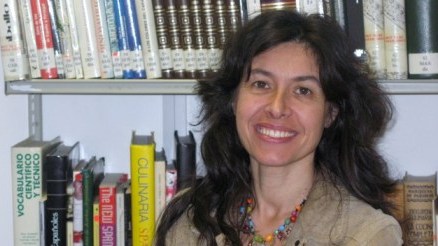Blog del Instituto Cervantes de Dublín
Torre Martello
Interview with Anamaría Crowe Serrano
Anamaría Crowe Serrano: What I want to do in my poetry is explore language

Interview with Anamaría Crowe Serrano held on 31st May 2011 at the Dámaso Alonso Library of the Instituto Cervantes in Dublin on the occasion of her participation in the round table discussion “More than poetry”, with Diego Valverde Villena.
Anamaría Crowe Serrano is a writer and lives in Dublin. She teaches Spanish language and translates Spanish and Italian contemporary poetry into English. In addition to her English translations of Mexican poets Gerardo Beltrán and Elsa Cross (Selected Poems, Shearsman, 2010) she has also published translations into Spanish of the Irish poets Seamus Heaney and Brendan Kennelly. As a poet, she is the author of a collection titled Femispheres (Shearsman, 2008).
Pilar Garrido: —Anamaría Crowe Serrano is an Irish poet and translator. Your second surname is Spanish. What part of Spain is your mother from?
Anamaría Crowe Serrano: —My mother is from Zaragoza, but I also have family in Bilbao. My mum came to Ireland about 40 years ago to study English, and she stayed and married my father. My first surname, Crowe, comes from my father.
Pilar Garrido: —What would you highlight from your work as a poet?
Anamaría Crowe Serrano: —For me, there are two key aspects to poetry: there’s the theme, what you want to express and, equally important, the way you express it, the way you manipulate language, how you create sound effects and how you can produce something original and creative with language. For me, that’s absolutely essential in poetry, sometimes it’s even more important than the theme.
Pilar Garrido: —When and how did you start writing poems?
Anamaría Crowe Serrano: —I started quite young. When I was 11 I had an inspiring teacher at school who instilled a huge love of writing in me. That continued in college. As my degree was in French and Spanish Language and Literature I studied poetry and loved it. I started writing poems, inspired at that time by the Latin American and French surrealists.
Pilar Garrido: —At that early age of 11, did you write in English or Spanish?
Anamaría Crowe Serrano: —I always write in English. Actually, I have a better command of English than Spanish, even though my Spanish is good but it’s more natural for me to write in English because I’ve always lived in Ireland. I’ve written maybe four or five poems in Spanish but I’ve never read them in public.
Pilar Garrido: —Which poet or poets have influenced you?
Anamaría Crowe Serrano: —There are lots. As a child, more than poetry it was Oscar Wilde’s short stories which I adored. Later on, as I was saying, at university I discovered the surrealists who have remained a constant influence. And then, when I left college, I took up Joyce whom I had never studied before. Joyce is always with me as a point of reference. I also love Cervantes’ Don Quixote. It’s a fabulous book, and while it’s not poetry, it is very poetic.
Pilar Garrido: —As we are in a country of writers, poets, musicians… who are your favourite Irish authors?
Anamaría Crowe Serrano: —In terms of poetry, my favourite is Eiléan Ní Chuilleanáin, who writes in English although she has an Irish name. Her work is really beautiful. I also like Yeats. I discovered Yeats many years ago and was fascinated by him. Heaney, of course, is so lyrical as well… But I also like the experimental poets, whose poetry is more contemporary, more edgy, and it does just what I want to do in my own poems, explore language. For example, there’s a poet who lives in Cork called Trevor Joyce, whose writing is really good.
Pilar Garrido: —You have also written short stories. Which one would you highlight?
Anamaría Crowe Serrano: —I wrote the short stories a long time ago, I hardly remember them. Maybe if I was to pick one it would be “The Barber’s Shop” about the life of a castrato, set in the times of these singers, the castrati. Their parents would sell them to the Church to be trained as musicians. Sometimes these children didn’t know they had been castrated until they were adults and they didn’t develop in the normal way. I was fascinated by that and wrote a story about it. Obviously, it’s a story about a fictitious child.
Pilar Garrido: —You’re a poet and also a translator. What kind of translations do you do?
Anamaría Crowe Serrano: —I usually translate poetry, mostly from Italian into English, but I’ve also translated from Spanish into English. Most of the Italian contemporary poetry I translate is by living poets, so I can always contact them if I have any doubts or queries. For me, it’s very important to be able to collaborate with the poet. As you know, there are so many ways to interpret a poem. Sometimes you might not understand it even if it’s in your native language. That’s why I believe it’s important to consult with the poet, whenever possible.
Pilar Garrido: —I imagine the two roles are very inter-related.
Anamaría Crowe Serrano: —Absolutely. I think it’s almost essential to be a poet in order to translate poetry. And poets usually prefer to be translated by another poet because you’re familiar with poetic techniques, the solutions that can be found for difficult turns of phrase. You might also have a sharper ear, sensitive to the sound and rhythm of poetry.
Recommended links
- [Video] Interwiew with Anamaría Crowe Serrano at the Instituto Cervantes in Dublin by Pilar Garrido
- [Audio] “El bilingüismo, una manera de sentir”. Interview with Anamaría Crowe Serrano in CanalUNED.
- Anamaría Crowe Serrano’s profile on Shearsman Books.
- One columbus leap by Anamaría Crowe Serrano.



